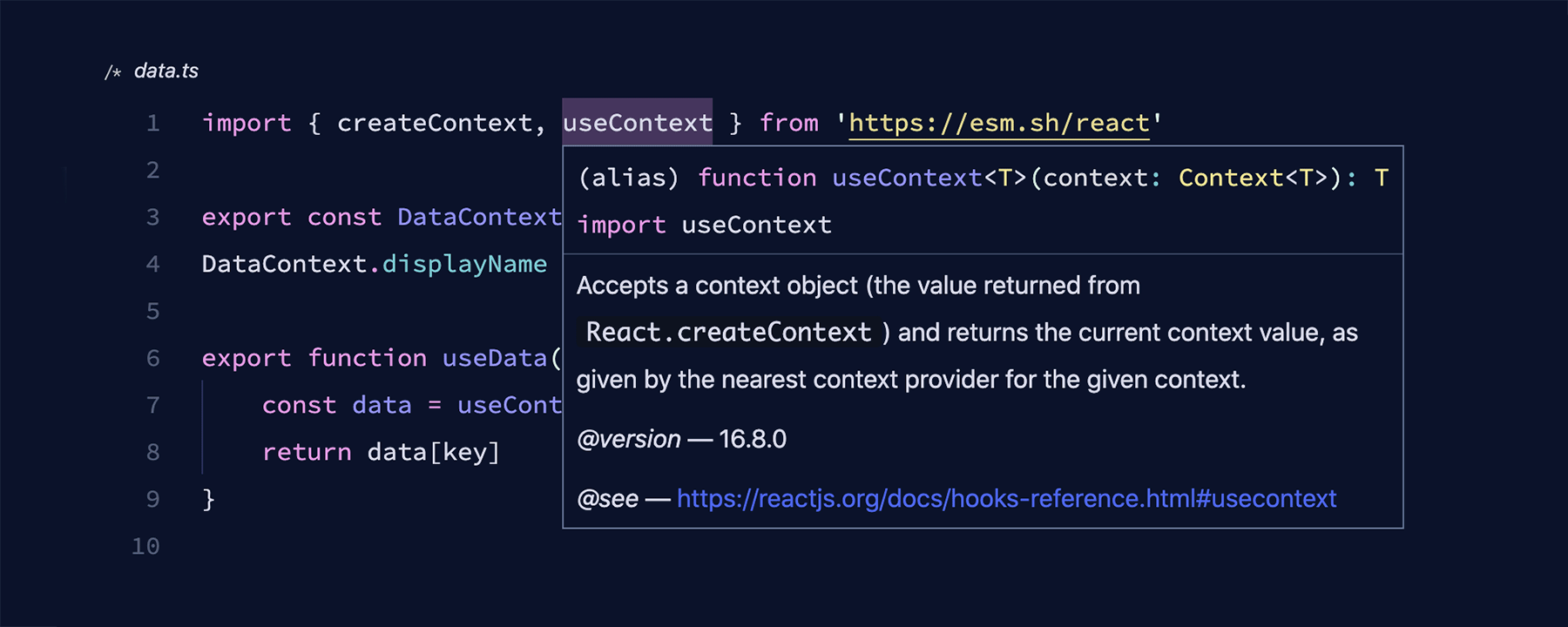A fast, global content delivery network to transform NPM packages to standard ES Modules by esbuild.
import React from 'https://esm.sh/react'import React from 'https://esm.sh/react@17.0.2'or import a major version:
import React from 'https://esm.sh/react@17'import { renderToString } from 'https://esm.sh/react-dom/server'or import non-module(js) files:
import 'https://esm.sh/tailwindcss/dist/tailwind.min.css'import { Button } from 'https://esm.sh/antd?bundle'In bundle mode, all dependencies will be bundled into a single JS file.
import React from 'https://esm.sh/react?dev'The ?dev mode builds code with process.env.NODE_ENV equals to development, that is useful to build modules like React to allow you get more development warn/error details.
import React from 'https://esm.sh/react@16.14.0'
import useSWR from 'https://esm.sh/swr?deps=react@16.14.0'By default, esm.sh rewrites import specifier based on the package's dependency statement. To specify version of dependencies you can use the ?deps=PACKAGE@VERSION query. You can separate multiple dependencies with commas: ?deps=react@16.14.0,react-dom@16.14.0.
import useSWR from 'https://esm.sh/swr?alias=react:preact/compat'in combination with ?deps:
import useSWR from 'https://esm.sh/swr?alias=react:preact/compat&deps=preact@10.5.14'The origin idea was came from @lucacasonato.
import React from 'https://esm.sh/react?target=es2020'By default, esm.sh will check the User-Agent header to get the build target automatically. You can specify it with the ?target query. Available targets: es2015 - es2021, esnext, node, and deno.
import Daygrid from 'https://esm.sh/@fullcalendar/daygrid'<link rel="stylesheet" href="https://esm.sh/@fullcalendar/daygrid?css">This only works when the NPM module imports css files in JS directly.
esm.sh supports ?worker mode to load modules as web worker:
import editorWorker from '/monaco-editor/esm/vs/editor/editor.worker?worker'
const worker = new editorWorker()esm.sh will resolve the node internal modules (fs, child_process, etc.) with deno.land/std/node to support some packages working in Deno, like postcss:
import postcss from 'https://esm.sh/postcss'
import autoprefixer from 'https://esm.sh/autoprefixer'
const { css } = await postcss([ autoprefixer ]).process(`
backdrop-filter: blur(5px);
user-select: none;
`).async()By default, esm.sh will respond with a custom X-TypeScript-Types HTTP header when the types (.d.ts) is defined. This is useful for deno type checks (link).
You can pass the no-check query to disable the X-TypeScript-Types header if some types are incorrect:
import unescape from 'https://esm.sh/lodash/unescape?no-check'Since we update esm.sh server very frequently, sometime we may break some packages that work fine previously by mistake, because we need to rebuild all modules when the patch pushed. To avoid this, you can pin the build version by the ?pin=BUILD_VERSON query.
import React from 'https://esm.sh/react@17.0.2?pin=v57'- Main server in HK
- Global CDN by Cloudflare
To host esm.sh by yourself, check hosting documentation.
